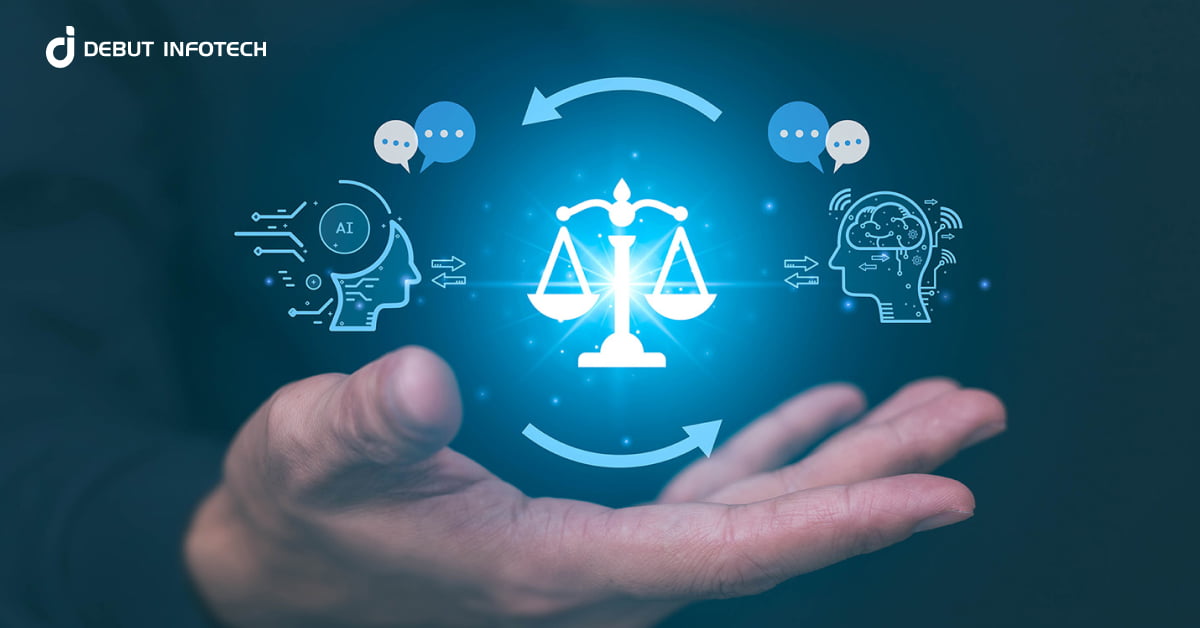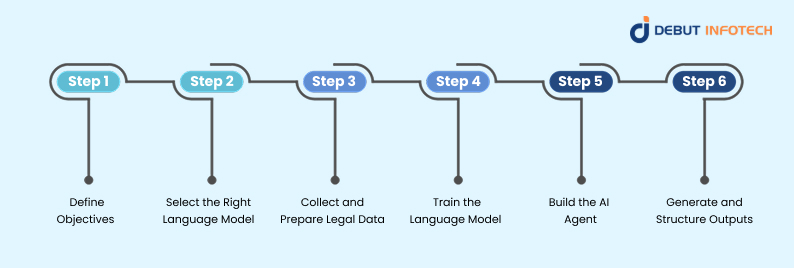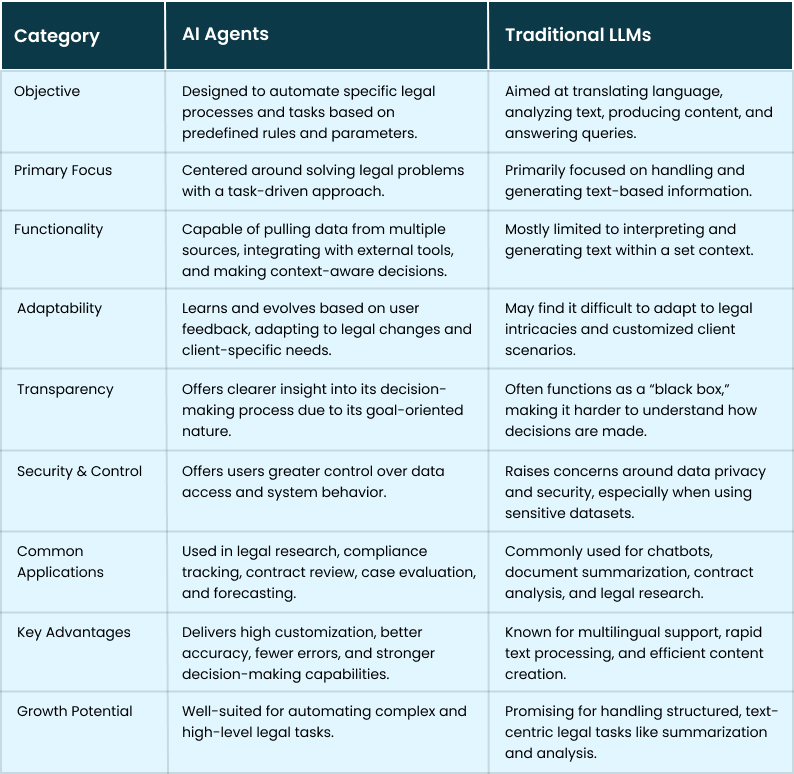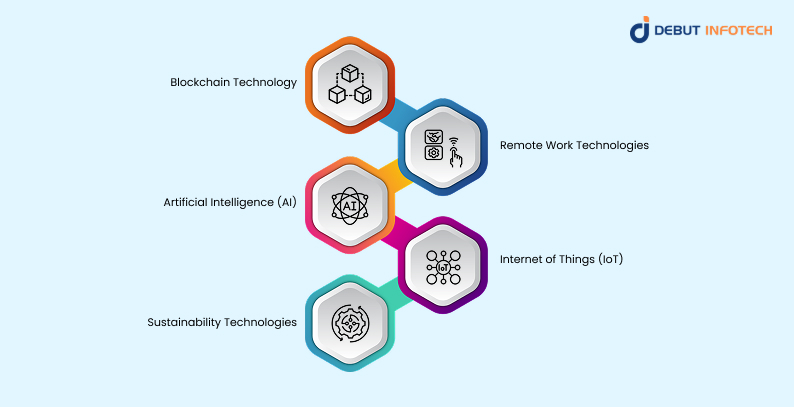Table of Contents
Home / Blog / Artificial Intelligence
The Role of AI Agents for Legal Document Management
May 20, 2025

May 20, 2025
The deployment of the artificial intelligence (AI) agent in the legal document management has revolutionized the legal profession. These advanced tools are designed to analyze legal documents with increased efficiency and accuracy. As law firms and corporate legal departments deal with high influxes of data and rigorous legal requirements, AI agents present ideas for the optimization of operations.
Adoption of AI in the legal industry is growing at a rapid pace. As reported in the 2024 Future Ready Lawyer Survey by Wolters Kluwer, 76% of corporate legal department lawyers and 68% of law firm lawyers use generative AI at least once a week, and more than a third use it daily. This trend points to a substantial shift towards adopting AI technologies in legal practices.
By automating routine tasks, AI agents allow the legal professionals to concentrate on more strategic initiatives. These tools improve document organization and retrieval, make information searching easy and can analyze large volumes of data to give insights that will inform legal strategies.
In this blog, we will look at various practical use-cases of AI agents, key components, and the wider implications of AI agents in legal document management.
Applications of AI Agents in Legal Document Management
AI agents are revolutionizing legal document processing because they increase precision, streamline the process and increase overall efficiency. Below are some key applications and real-world use cases you need to know about:
1. Contract Review and Analysis
AI agents simplify the process of contract analysis by focusing on specific key terms, obligations, and issues. Not only does it save time but also reduces human mistakes. By comparing contracts with legal standards and past case data to identify inconsistencies and propose revisions to enhance compliance and clarity, AI is capable of detecting such issues.
2. Legal Research and Case Law Analysis
Acting as AI Copilots, these agents leverage large language models (LLMs) to rapidly analyze case law, legislation, and legal articles. They identify relevant precedents and legal doctrines and give advanced insight that speeds up research. Through natural language processing, these agents can understand and make sense of complicated legal registers, and provide highly specific context relevant recommendations to facilitate better legal statements.
3. Document Drafting and Creation
AI agents for legal document creation streamline the drafting process by generating templates and language that adhere to legal standards. They guarantee that one is up to date with the current regulations and incorporate a protective clause for all involved parties. Whether it be NDAs and employment contracts or lease agreements, AI tools can produce and customize documents in accordance with the needs of a client thus increasing both consistency and productivity.
4. Document Management and Organization
AI systems improve legal document management through automation of categorization, tagging, and indexing. This makes it easier to store, search and access documents. Also, AI tools can summarize long legal texts, extract the necessary information, and give condensed overviews, which can save much time to legal professionals.
5. Enhanced Client Communication and Service
Conversational AI tools, such as chatbots and virtual assistants, deliver immediate replies to common legal questions and keep them informed in real-time about the progress on cases. These tools start consultations, collect preliminary information and provide basic legal advice offloaded with preloaded information. This enhances responsiveness and guarantees that clients are kept up-to-date and supported throughout the process of their legal case.
6. Predictive Analytics and Litigation Support
The review of past case outcomes will enable AI agents to predict likely results in ongoing litigation. This facilitates strategic decision making that helps lawyers to improve on their legal approach. AI also helps in e-discovery, by sifting through digital records quickly and finding evidence (cutting down on both the time, and the costs associated with litigation).
Related Read: How AI Agents for Business Work and Why They Matter
Transform Legal Documents from Tedious to Effortless with AI
Automate document review, slash errors, and reclaim hours, all with AI precision. Discover tools built for legal teams who value accuracy and speed
How to Develop AI Agents for Legal Document Management
The development of AI agents for controlling legal documents requires an intelligent combination of machine learning, NLP, automation, in order to improve legal processes and compliance.

Step 1: Define Objectives
Begin by summarizing the key goals such as recognizing key contract clauses, terms, and legal requirements etc. Clearly outline the relevant laws, regulations, and case precedents to establish a strong base for AI-driven legal analysis.
Step 2: Select the Right Language Model
Choose a language model that is able to manage legal language appropriately. Partner with specialized AI development services to fine-tune models for tasks like summarization, understanding, and reasoning, which are crucial for analyzing complex legal content.
Step 3: Collect and Prepare Legal Data
Provide excerpts from high quality legal papers, such as contracts, case law and statutes. Make sure the data is clean, preprocessed and well formatted in order to facilitate quality and contextually correct outputs from the language model.
Step 4: Train the Language Model
Improve the LLM by fine tuning it on legal data of the domain, to enhance legal document processing capabilities. This customisation will allow the model to understand the legal terms, structure of document and the reasoning template which is required for a good legal process.
Step 5: Build the AI Agent
Design the AI agent as a modular system equipped with legal functionalities. Integrate the fine-tuned LLM to perform jobs, such as contract analysis, clause extraction and compliance checks with efficiency and accuracy.
Step 6: Generate and Structure Outputs
Develop AI algorithms that enable accurate document reviews and recognition of clauses. Develop capabilities to summarize legal texts, review precedents and present easy to apply insights for the legal professionals.
AI Agents vs. Traditional LLMs in Legal Document Management
Understanding the difference between the AI agents and traditional LLMs is very much required to pick up the best instrument for dealing with the legal documents. As part of the future of AI agents, blockchain technology also plays a role in enhancing security and transparency in the documentation process. Below you will find a table which summarizes their capabilities, advantages and limitations.

Benefits of AI Agents in Legal Document Management
AI agents are revolutionizing legal document management particularly in legal document processing, by automating workflows, reducing human error, automating redundant work and making legal professionals focus more on strategic complex work.
Stronger Risk Analysis and Due Diligence
AI systems are capable of quickly assessing large volumes of legal documents to identify possible problems, threats, inconsistencies, which may be ignored by human reviewers.
Accelerated Legal Research and Insights
These agents are effective at sorting a large volume of case law, legal texts and regulations to identify pertinent ideas and are of great value to legal teams.
Cost Efficiency
Through the optimization of document workflows and by increasing productivity, AI agents contribute to minimizing the operational costs related to legal document management. AI consulting services can further refine these implementations, ensuring tailored solutions that maximize resource allocation for critical legal functions.
Enhanced Client Experience
AI-powered solutions are utilized for client experience, providing quicker access to information, enhanced reporting abilities and more effective service delivery.
Read also our new blog: 10 Powerful AI Agents for Social Media in 2025
Emerging Trends in AI Agents for Legal Document Management
With continuous developments in technology legal organizations need to continuously pursue and engage new innovations to increase efficiency, security and compliance. The following are key future trends in AI and related technologies relevant to legal document management:

1. Blockchain Technology
Blockchain offers a secure and immutable record system that makes it a very good tool for the preservation of integrity in documents and smart contract deployment. This technology is utilized in legal document management for dealing with sensitive client details, authentication, and storing records of all activities.
2. Remote Work Technologies
The expansion of remote professional legal practices has played a strong role in driving the adoption of secure collaboration solutions. These include encrypted video conferencing, cloud-based document repositories, and project management platforms designed to maintain confidentiality and streamline workflow among distributed legal teams.
3. Artificial Intelligence (AI)
Artificial Intelligence is redefining legal practice through automated document review, intelligent data extraction, and predictive analytics. With such features, the process of case preparation can be done more efficiently, compliance monitoring is improved and enhanced and the decision-making processes are strengthened by using insights from the data. These advancements align with broader AI trends, such as the rise of specialized tools that enhance accuracy and efficiency in legal workflows.
4. Internet of Things (IoT)
Despite being traditionally related to physical objects, IoT can be utilized in legal environments to provide secure, live tracking of valuable documents and property. Advanced IoT technologies may be used to increase chain of custody verification and improve document security.
5. Sustainability Technologies
More law firms and legal departments are turning towards environmentally sustainable practices. The use of paperless workflow, enhanced energy conserving data centers, and digital signature tools are increasingly being embraced in the bid to ensure sustainability in dealing with documents. Innovations in generative AI development further support this shift, enabling dynamic document generation while minimizing environmental impact.
Navigating the Challenges of AI Integration in Legal Document Management
The balance between efficiency, accuracy, and automation can be enormously enhanced in legal document management when using Artificial Intelligence (AI). However, its implementation results in unique challenges that legal bodies are required to address beforehand. This section defines major problems and solutions to overcome them.
1. Data Privacy and Security
AI applications that deal with legal document processing should be characterized by high standards of privacy and security. Since legal data is so sensitive, a breach or even illegal access can lead to considerable legal and reputational risks.
For the sake of mitigating these risks, law firms need to implement new high-end encryption methods combined with AI based cybersecurity systems. Services such as real-time threat detection, automatic response to incidents, and continuous anomaly monitoring play a fundamental role in client confidentiality and adherence to the relevant laws on data protection.
2. Ethical Use of AI in Document Management
It is critical to ensure that AI functions are implemented ethically in legal proceedings to maintain confidence in clients and adhere to regulatory requirements. When AI is misused, it can add to biased judgments or unfair practice.
While addressing this issue, law firms must apply AI-based systems that maintain strict ethical principles. This involves promoting transparency in AI decision-making, reviewing AI models on a frequent basis in order to identify and remedy biases, and documenting the outcomes of AI when necessary.
3. System Integration Complexities
Integrating artificial intelligence with existing document management systems is usually a hard and expensive task. Many legal organizations rely on out-of-date systems, which are no longer compatible with modern AI developments.
In order to attain integration success, it is critical to pick out AI solutions that easily integrate with present systems and processes. In order to attain integration success, it is critical to partner with specialized AI development companies that design interoperable solutions aligned with legacy systems.
4. Change Management and User Adoption
Many professionals tend to oppose the adoption of new technologies, particularly those used to traditional methods of document management.
To encourage the adoption of AI, firms should adopt formal change management plans such as clearly depicting AI advantages, enabling feedback from the users and also ensuring consistency of commitment from the leadership. Addressing concerns and acknowledging early wins can motivate user engagement and facilitate successful integration of AI systems.
5. Training and Support for Legal Professionals
The absence of adequate training may leave legal professionals stranded and unable to maximize the use of AI tools thereby causing inefficiencies and low usage.
The legal sector companies are expected to focus on far-reaching AI training programs for legal processes and are required to provide constant educational help. Ongoing education and a responsive support team help ensure that practitioners are confident and competent in using AI for document management.
Unsure How AI Fits Into Your Legal Workflow? We’ve Got Answers.
Debut Infotech crafts custom AI agents for document management, secure, precise, and tailored to your workflow. Let’s redefine efficiency.
Final Thoughts
There are significant changes in the legal industry due to new digital tools. With such solutions, legal professionals are in a more advantageous position to handle critical, expert-oriented tasks. In addition, they improve accuracy while ensuring that documents are also handled with more care and standardization.
In addition to transforming workflows, these tools enable collaboration by compiling documents and offering constant updates. This ensures much smoother running of the operations with all team members being highly informed. As time goes by, these systems will become more intelligent and efficient with technological advancements.
Their successful integration requires complete planning and clear strategy, such as understanding how to build an ai agent tailored to legal workflows, but the outcomes are clear. Using these advancements, law firms are able to increase efficiency, reduce overhead costs and remain competitive in the market of digital law.
Going forward, an increase in the implementation of advanced technology for legal documents management is expected. Legal firms that adopt these resources can be prepared not only to face the complexity of the industry, but also make their service more attractive and be the leaders in modern legal practice.
Frequently Asked Questions (FAQs)
Q. How does AI summarize legal documents?
A. Tools designed for legal document analysis use advanced technology to quickly review and condense complex legal texts. This gives you clear, concise summaries, helping you spend less time on paperwork and more time on higher-level legal tasks.
Q. How to use AI for law?
A. One of the most straightforward and widely used applications of AI in the legal field is e-discovery. This involves reviewing electronic data to find non-privileged information that may be important to a case. With e-discovery tools, lawyers can quickly search through documents using keywords or filters like date ranges and locations, making the process faster and more efficient.
Q. What are the 5 types of AI agents?
A. AI agents vary in complexity. Some follow fixed rules, while others adapt based on experience. The five primary types include simple reflex agents, model-based reflex agents, goal-based agents, utility-based agents, and learning agents.
Talk With Our Expert
Our Latest Insights
USA
Debut Infotech Global Services LLC
2102 Linden LN, Palatine, IL 60067
+1-708-515-4004
info@debutinfotech.com
UK
Debut Infotech Pvt Ltd
7 Pound Close, Yarnton, Oxfordshire, OX51QG
+44-770-304-0079
info@debutinfotech.com
Canada
Debut Infotech Pvt Ltd
326 Parkvale Drive, Kitchener, ON N2R1Y7
+1-708-515-4004
info@debutinfotech.com
INDIA
Debut Infotech Pvt Ltd
Sector 101-A, Plot No: I-42, IT City Rd, JLPL Industrial Area, Mohali, PB 140306
9888402396
info@debutinfotech.com



Leave a Comment